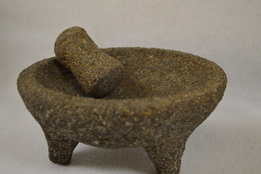
“Sometimes I would take the time to look at the molcajete and the stone metate and ask my mother how long she had used these. She would shrug her shoulders and then smile and say, ‘Always.’”
Sally’s parents, Juana and Candido Rivera, entered the United States as immigrants fleeing the Mexican Revolution. During the Great Depression, they moved from Arizona to California.
Very carefully, the families planned their move. They rebuilt homes, house by house. The wife of one of the widowed families was alone, and they built her home too. No one was left behind.
As a result of the community pooling its resources and moving to California together, nearly everyone on her street was from Arizona, and nearly every family was related.
So I grew up on a street where everyone was part of my extended family. I could visit my Tia [aunt] and primos [cousins] at the end of the block and if I was hungry they gave me something to eat. If I was tired, my aunt would put me down for a nap. I was safe and well cared for and loved by my family and my neighbors. Everyone cared for the others and took care of each other’s children.
On Saturday mornings Sally would go to her grandmother’s house when her own mother slept in.
She was always working in the kitchen and sometimes I would watch her make chili in her molcajete [mortar]. While she cooked she would have me sit in a small chair. I loved talking to her, having her all to myself, all the while embroidering pictures and watching her work.
Sally also valued time spent in the kitchen with her mother.
I would come home from school while my mother was in the kitchen preparing dinner and she would give me a choice of what I could help her prepare. Sometimes I played with the molcajete for so long that my fingers would sting from handling the chilies.
Like my grandmother, my mother would talk to me while we worked together in the kitchen. She never criticized me for the way I did things or about the things I talked about. She would just acknowledge with a smile and a nod and sometimes ask a question or make a little comment.
The kitchen was more than a place for preparing food; it was the central hub of family warmth, feeding not only the stomach but also the soul.
I always remember the special way I felt when I spent time in the kitchen with my grandmother and with my mother. I learned from them that companionship in the kitchen is a good way of knowing the people you love. When my sons were teenagers I had a rule that they were required to follow each day. They must be home for dinner and keep me company while I prepared it. And although I didn’t make them help me with dinner, they learned something by watching me and I sure learned a lot about them and their lives.
Sally inherited the family molcajete, pictured above. It had been passed from her grandmother to her mother to her Aunt Dalia. One day Tia Dalia asked if there was anything of hers that Sally wanted.
I told her that I wanted grandma’s molcajete if she was willing to let me have it. She laughed and said, ‘The molcajete is magic. Do you make chile? You can do lots of things with it.’
For quite some time I would use it to make food. Later, I just decided to use a blender or a food processor. However, the molcajete sits on my kitchen counter as a reminder that food is made with love for the nourishment of my loved ones. By holding it or seeing it, I am often reminded of the sacrifices made by my mother and my grandmother who made sure that the family was nourished by food and by love.